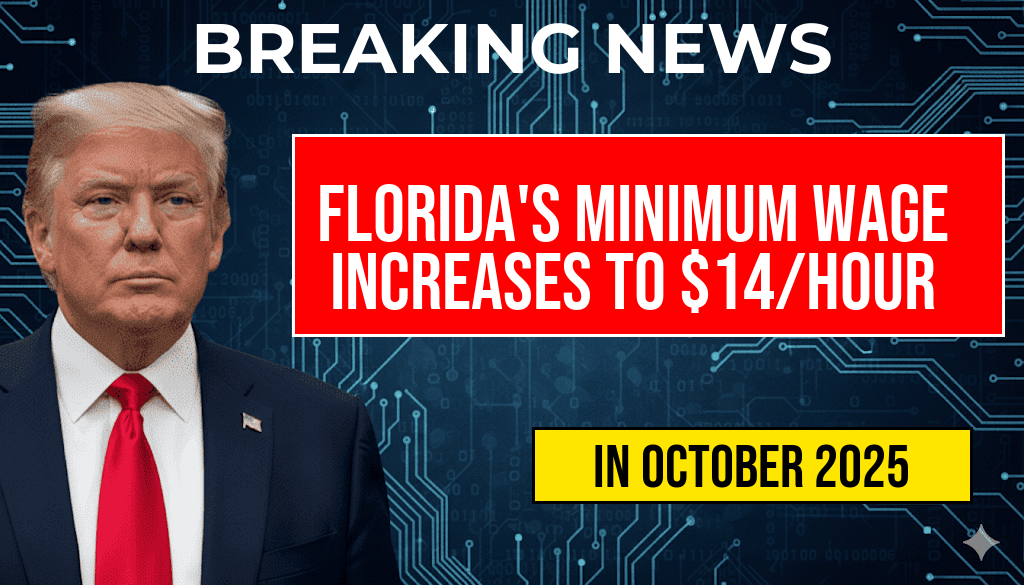Florida’s recent adjustment to its minimum wage, increasing to $14 per hour, is set to benefit full-time workers significantly. This change translates to an additional $2,080 annually for those working a standard 40-hour week. The increase, effective from September 30, 2023, is a part of the state’s ongoing commitment to raising the minimum wage to $15 per hour by 2026. Advocates for worker rights hail this move as a step towards alleviating financial pressures faced by many Floridians, especially in a state where the cost of living continues to rise. As the state implements this wage increase, the broader implications for the economy and local businesses are under scrutiny.
Background of Florida’s Minimum Wage Increase
Florida voters approved Amendment 2 in November 2020, which mandated incremental increases to the state’s minimum wage. The amendment outlined a clear path to reach $15 per hour by 2026, with annual adjustments designed to account for inflation. As part of this plan, the latest increase to $14 per hour demonstrates the state’s commitment to improving the financial well-being of its workforce.
Impact on Workers and Their Families
For full-time employees, the wage increase is more than just a number; it represents a tangible change in their financial situation. Here are some key points regarding the impact:
- Increased Earnings: Workers earning $14 an hour will receive an annual salary of approximately $29,120 before taxes, up from about $27,040 at the previous rate of $13 per hour.
- Cost of Living Adjustments: The increased wage aims to help workers cope with rising living expenses in urban areas such as Miami and Orlando, where housing costs have surged.
- Potential Economic Stimulus: With more disposable income, workers are likely to spend more in their local economies, potentially benefiting businesses.
Reactions from Business and Labor Leaders
The reaction to the wage hike has been mixed. Labor leaders celebrate the increase as a necessary adjustment, emphasizing the importance of fair wages in a robust economy. “This is a victory for workers who have fought tirelessly for a living wage,” said a representative from the Florida AFL-CIO.
Conversely, some business owners express concerns about increased labor costs. Small businesses, in particular, worry about the impact on their profitability and ability to hire. “We want to pay our employees fairly, but this increase could force us to make tough decisions,” noted a local restaurant owner.
Future Projections and Economic Considerations
As Florida moves closer to the $15 minimum wage target, various economic studies suggest both positive and negative outcomes. A report from the Economic Policy Institute indicates that raising the minimum wage can lead to increased productivity and reduced employee turnover, which benefits businesses in the long run. However, other analyses caution that significant wage increases could lead to job losses in certain sectors, particularly in small businesses that operate on thin margins.
| Year | Minimum Wage |
|---|---|
| 2023 | $14.00 |
| 2024 | $15.00 |
| 2025 | To Be Determined |
| 2026 | To Be Determined |
Conclusion
The increase to a $14 per hour minimum wage represents a significant milestone for Florida’s workforce. As the state moves towards its goal of $15 per hour, the implications of this change will unfold in real-time, influencing the lives of many Floridians and the broader economy. Stakeholders on both sides of the debate will continue to monitor the effects of this wage increase as Florida navigates its economic future.
For more detailed information on minimum wage policies, you can visit the Wikipedia page on minimum wage in the United States or read the economic analysis from the Economic Policy Institute.
Frequently Asked Questions
What is the new minimum wage in Florida?
The new minimum wage in Florida is set at $14 per hour.
How much additional income will full-time workers earn annually?
Full-time workers will receive an additional $2,080 annually due to the increase in the minimum wage.
When did the new minimum wage take effect?
The new minimum wage of $14 per hour took effect on January 1, 2024.
Who is eligible for the new minimum wage?
All full-time workers in Florida are eligible for the new minimum wage of $14 per hour, subject to certain exceptions.
How does this increase compare to previous minimum wage levels in Florida?
This increase to $14 per hour marks a significant rise from the previous minimum wage of $12 per hour that was in effect before this change.

Leave a Reply